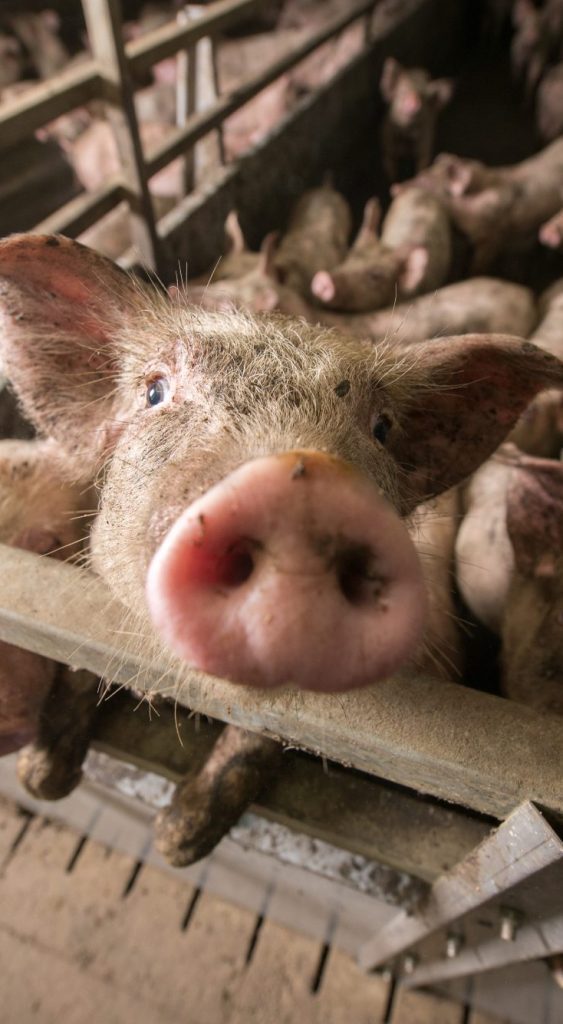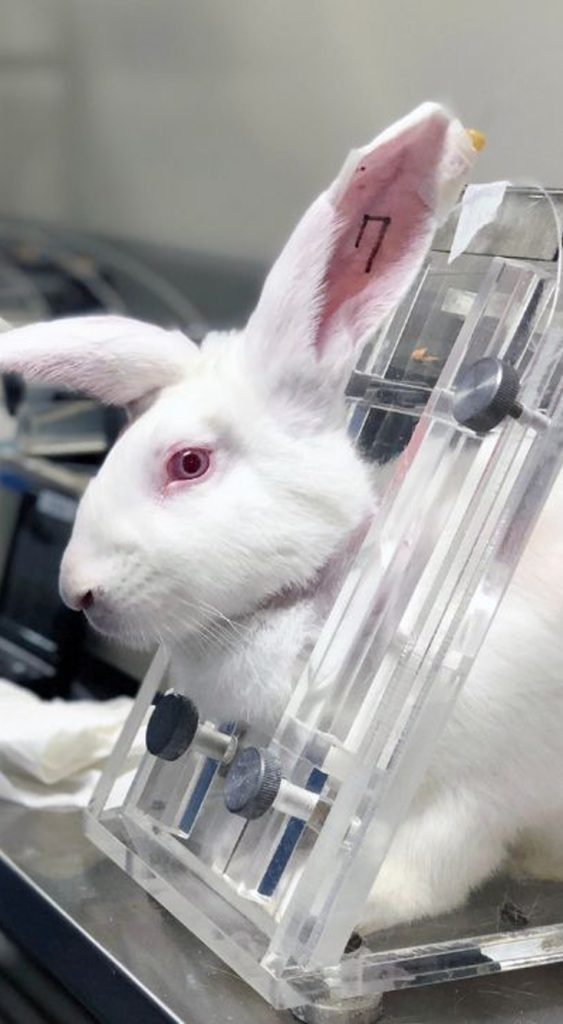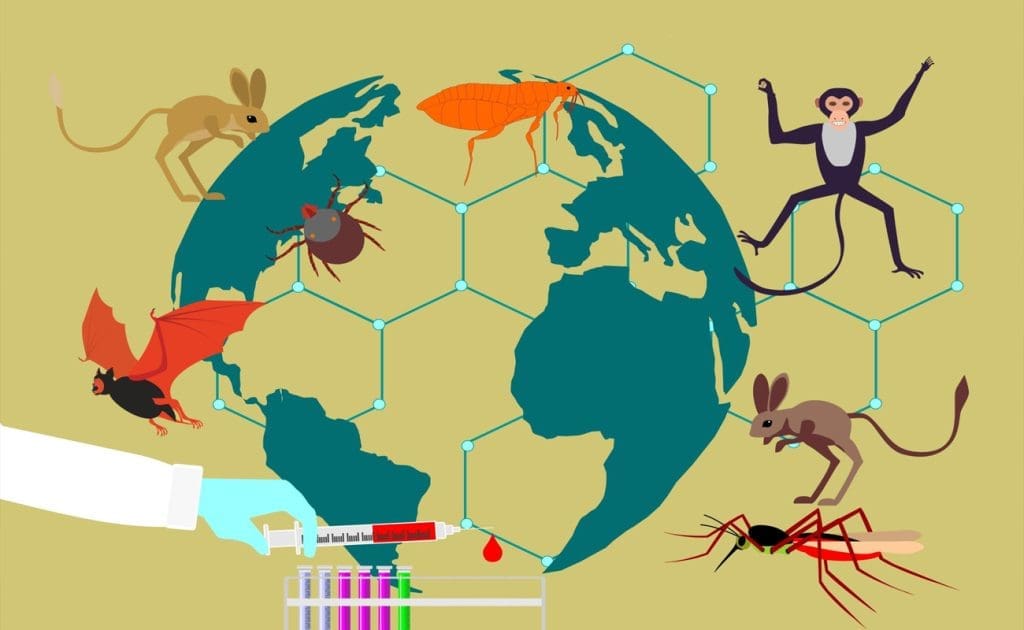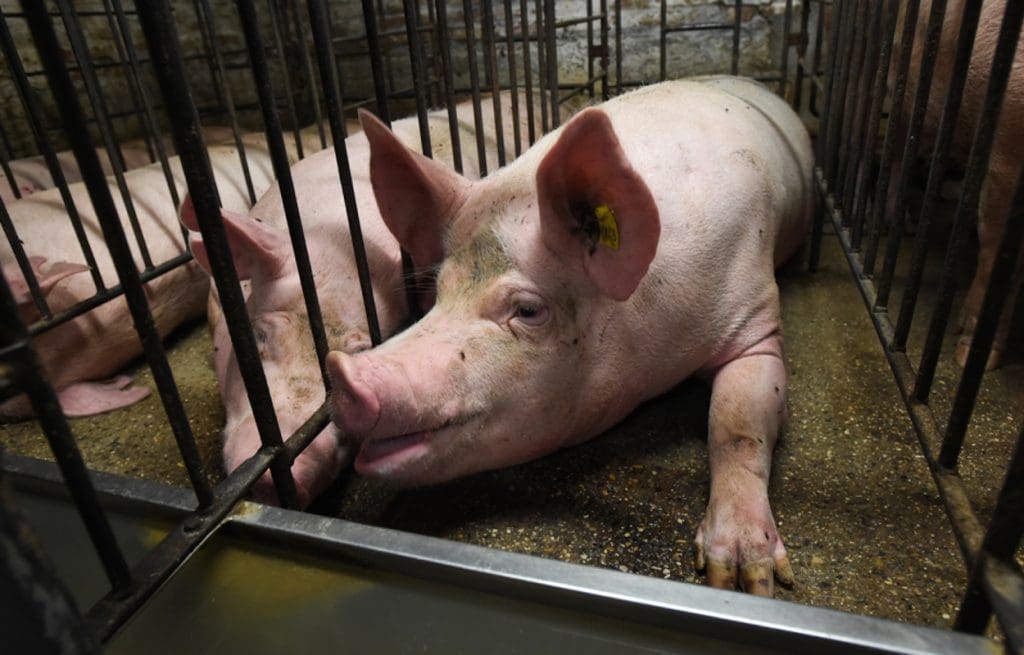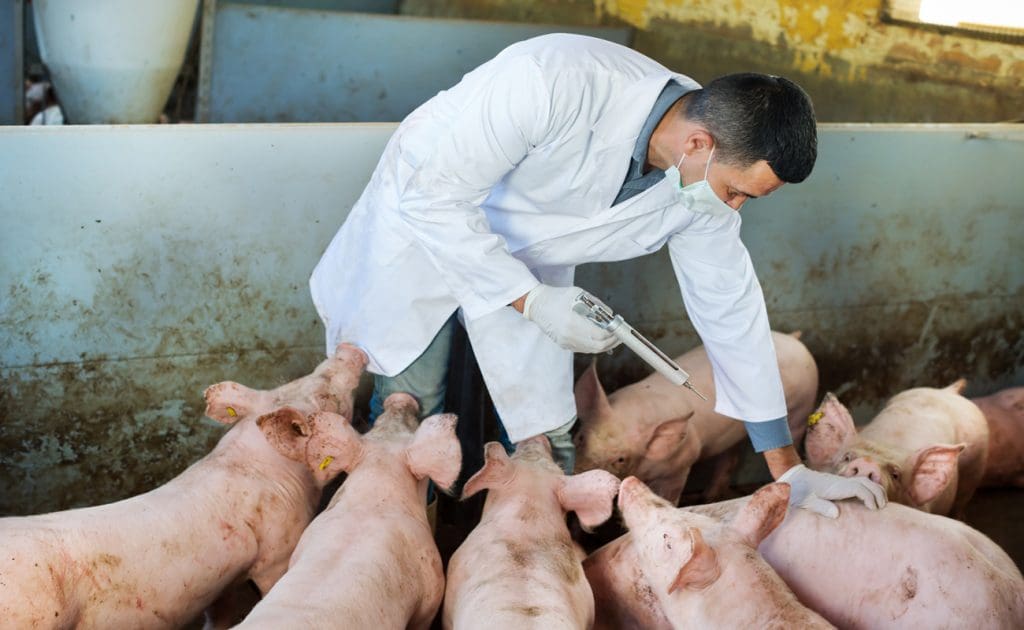
15.000 litrov
Voda je potrebna za proizvodnjo le en kilogram govejega mesa-izrazit primer, kako živalsko kmetijstvo porabi tretjino svetovne sveže vode. [1]

80%
Amazonskega krčenja gozdov povzroča rančenje goveda - krivec številka ena za uničenjem največjega svetovnega deževnega gozda. [2]

77%
svetovnega kmetijskega zemljišča se uporablja za živino in krmo za živali - vendar zagotavlja le 18% svetovnih kalorij in 37% beljakovin. [3]

Toplogredni plini
Industrijsko živalsko kmetijstvo proizvaja več toplogrednih plinov kot celoten svetovni prometni sektor skupaj. [4]

92 milijard
Od svetovnih kopenskih živali se vsako leto ubijejo za hrano - in 99% jih trpi življenje na tovarniških kmetijah. [5]

400+ vrst
strupenih plinov in 300+ milijonov ton gnoja ustvarjajo tovarniške kmetije, ki zastrupljajo naš zrak in vodo. [6]

1.048 milijonov ton
žita se hranijo v živino letno - dovolj, da večkrat končajo globalno lakoto. [7]

37%
Emisij metana prihaja iz živalskega kmetijstva - toplogrednega plina 80 -krat močnejši kot Co₂, ki vodi podnebno razpad. [8]

80%
antibiotikov po vsem svetu se uporabljajo pri tovarniških živalih, ki gorivajo odpornost na antibiotike. [9]

1 do 2,8 bilijona
Morske živali letno ubijejo z ribolovom in ribogojstvom - večina se sploh ne šteje v statistiko kmetijstva živali. [10]

60%
Izguba globalne biotske raznovrstnosti je povezana s proizvodnjo hrane - pri čemer je vodilni dejavnik živali. [11]

75%
svetovnega kmetijskega zemljišča bi lahko osvobodili, če bi svet sprejel rastlinsko prehrano-odklenil območje velikosti ZDA, Kitajske in Evropske unije skupaj. [12]

Kaj počnemo
Najboljše, kar lahko storimo, je, da spremenimo način jesti. Rastlinska prehrana je bolj sočutna izbira tako za naš planet kot za raznolike vrste, s katerimi sobivamo.

Reši zemljo
Živalsko kmetijstvo je glavni vzrok za izgubo biotske raznovrstnosti in izumrtje vrst po vsem svetu, kar močno ogroža naše ekosisteme.
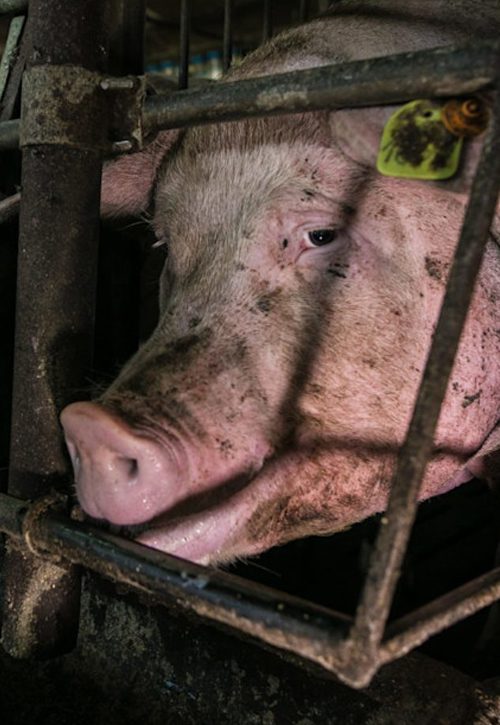
Končajo svoje trpljenje
Tovarniško kmetovanje se močno zanaša na povpraševanje potrošnikov po proizvodih mesa in živali. Vsak rastlinski obrok prispeva k osvobajanju živali iz sistemov surovosti in izkoriščanja.

Uspevajo na rastlinah
Rastlinska hrana ni le okusna, ampak je tudi bogata z esencialnimi vitamini in minerali, ki povečujejo energijo in spodbujajo splošno dobro počutje. Prehrana, bogata z rastlinami, je učinkovita strategija za preprečevanje kroničnih bolezni in podporo dolgoročnemu zdravju.
Krutost v tovarniški reji:
Kjer živali trpijo v tišini, mi postanemo njihov glas.
Trpljenje živali v kmetijstvu
Kadar koli so živali oškodovane ali njihovi glasovi ne bodo slišali, stopimo, da se soočimo s surovostjo in sočutjem. Neumorno si prizadevamo izpostavljati krivico, spodbuditi trajne spremembe in zaščititi živali, kjer koli je grožnja njihovega blaginje.
Kriza
Resnica za našo prehransko industrijo
Resnica, ki se skriva za našo živilsko industrijo, razkriva skrito resničnost krutosti v tovarniški reji , kjer milijarde živali vsako leto trpijo neizmerno trpljenje. Poleg vpliva na dobrobit živali industrijska reja povzroča tudi resno okoljsko škodo , od podnebnih sprememb do izgube biotske raznovrstnosti. Hkrati sistem prispeva k naraščajočim zdravstvenim tveganjem, vključno z debelostjo, sladkorno boleznijo in srčnimi boleznimi. Izbira rastlinske prehrane in sprejemanje trajnostnih življenjskih navad ponuja močno rešitev – zmanjšanje trpljenja živali , zaščito planeta in izboljšanje zdravja ljudi .
Mesna industrija
Živali, ubitih zaradi mesa
Živali, ubitih zaradi svojega mesa, začnejo trpeti na dan, ko se rodijo. Mesna industrija je povezana z nekaterimi najtežjimi in nečloveškimi praksami zdravljenja.

Krave
Krave, rojene v trpljenju, trpijo strah, izolacijo in brutalne postopke, kot sta odstranjevanje rogov in kastracija - dolgo, preden se zakol začne.
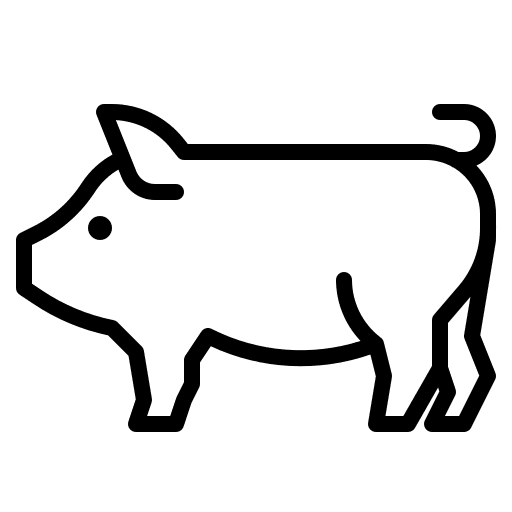
prašiči
Prašiči, bolj inteligentni kot psi, preživljajo življenje na utesnjenih kmetijah brez oken. Ženske prašiče najbolj trpijo - poudarjeno impregnirane in omejene na tako majhne zaboje, da se sploh ne morejo obrniti, da bi potolažile svoje mlade.

kokoši
Piščanci zdržijo najslabše tovarniške kmetovanje. Na tisoče, ki jih naberejo v umazane lope, jih vzrejajo tako hitro, da se njihova telesa ne morejo spoprijeti - vodite se do bolečih deformacij in zgodnje smrti. Večina je ubitih pri samo šestih tednih.

Jagnjeti
Jagnjeti trpijo boleče pohabljenje in jih odtrgajo od mater le nekaj dni po rojstvu - vse zaradi mesa. Njihovo trpljenje se začne prezgodaj in konča prezgodaj.

Zajci
Zajci trpijo brutalne uboje brez pravne zaščite - marsikaj se pretepajo, nemišajo in imajo rezanje grla, ko so še vedno zavestni. Njihova tiha agonija pogosto ostane nevidna.

Purani
Vsako leto milijoni puranov kruto umrejo, mnogi poginejo zaradi stresa med prevozom ali pa jih celo živih skuhajo v klavnicah. Kljub svoji inteligenci in močnim družinskim vezi trpijo tiho in v velikem številu.
Onkraj krutosti
Mesna industrija škoduje tako planetu kot našemu zdravju.
Mesni vpliv na okolje
Reja živali za hrano porablja ogromne količine zemlje, vode in energije ter povzroča veliko okoljsko škodo. Organizacija Združenih narodov za prehrano in kmetijstvo (FAO) pravi, da je zmanjšanje porabe živalskih proizvodov ključnega pomena za boj proti podnebnim spremembam, saj živinoreja predstavlja skoraj 15 % svetovnih emisij toplogrednih plinov. Industrijske kmetije prav tako zapravljajo ogromne vodne vire – za krmo, čiščenje in pitje – hkrati pa onesnažujejo več kot 56.000 kilometrov vodnih poti v ZDA.
Zdravstvena tveganja
Uživanje živalskih izdelkov povečuje tveganje za resne zdravstvene težave. Svetovna svetovna organizacija predelano meso razvrsti kot rakotvornik in tako poveča tveganje za raka debelega črevesa in rektalne za 18%. Živalski proizvodi so veliko nasičenih maščob, povezanih s srčnimi boleznimi, možganskimi kapi, diabetesom in rakom - vodilni vzroki smrti v ameriških študijah kažejo, da vegetarijanci živijo dlje; Ena raziskava je pokazala, da je v primerjavi z mesnimi jedli 12% manj verjetno, da bodo umrli v šestih letih.
Mlečna industrija
Mlekarna je temna skrivnost
Za vsakim kozarcem mleka je cikel trpljenja - matere krave so večkrat impregnirane, le da jim odvzema teleta, da se jim mleko pobere za ljudi.
Zlomljene družine
Na mlečnih kmetijah matere jokajo za teleta, ko so jih odvzeli - zato je mleko, namenjeno zanje, lahko za nas ustekleničeno.
Omejen sam
Teleta, odtrgana od mater, preživijo svoje zgodnje življenje v hladni izolaciji. Njihove matere ostajajo privezane v utesnjenih stojnicah, trajne leta tihega trpljenja - samo proizvodnjo mleka, ki nam nikoli ni bilo namenjeno.
Boleče pohabljenje
Od pekoče bolečine žigosanja do surove agonije obrezovanja rogov in krajšanja repov – ti nasilni postopki se izvajajo brez anestezije, krave pa so brazgotinjene, prestrašene in zlomljene.
Brutalno ubit
Krave, vzrejene za mleko, se soočajo s krutim koncem, zaklanejo premladi, ko ne proizvajajo več mleka. Mnogi trpijo boleča potovanja in med zakolom ostanejo zavestni, njihovo trpljenje, skrito za industrijskimi stenami.
Onkraj krutosti
Kruta mleka škodi okolju in našem zdravju.
Okoljski stroški mleka
Mlečna živinoreja sprošča velike količine metana, dušikovega oksida in ogljikovega dioksida – močnih toplogrednih plinov, ki škodujejo ozračju. Prav tako spodbuja krčenje gozdov s spreminjanjem naravnih habitatov v kmetijska zemljišča in onesnažuje lokalne vodne vire zaradi nepravilnega ravnanja z gnojem in gnojili.
Zdravstvena tveganja
Uživanje mlečnih izdelkov je povezano z večjimi tveganji resnih zdravstvenih težav, vključno z raki dojk in prostate, zaradi visokih ravni rastnega faktorja, podobnega insulinu. Medtem ko je kalcij bistvenega pomena za močne kosti, mlečni mlečni program ni edini ali najboljši vir; Leafy zelenico in utrjene pijače na rastlinski barvi ponujajo surovo, bolj zdravo alternativo.
Jajčna industrija
Življenje kletke kokoši
Kokoši so družabne živali, ki uživajo hranjenje in skrbi za svoje družine, vendar preživijo do dve leti, utesnjeni v drobnih kletkah, ne morejo širiti kril ali se obnašati naravno.
34 ur trpljenja: resnični stroški jajca
Moški piščanca
Moški piščanci, ki ne morejo odložiti jajc ali rasti kot mesne piščance, se v jajčni industriji štejejo brez vrednosti. Takoj po izvalitvi se ločijo od samic in kruto ubijejo - bodisi zadušeni bodisi živijo v industrijskih strojih.
Intenzivna zaprtost
V ZDA je skoraj 75% kokoši natrpanih v drobne žične kletke, vsaka z manj prostora kot list papirja tiskalnika. Prisiljen stati na trdih žicah, ki jim poškodujejo noge, veliko kokoši trpi in umre v teh kletkah, včasih pa je pustil razpadati med živimi.
Krute pohabljenje
Kokoši v jajčni industriji trpijo zaradi ekstremnega zaprtja v zaprtih prostorih, kar vodi do škodljivega vedenja, kot sta samopoškodovanje in kanibalizem. Posledično delavci nekaterim od njih odrežejo občutljive kljune brez protibolečinskih zdravil.
Onkraj krutosti
Jajčna industrija škoduje našemu zdravju in okolju.
Jajca in okolje
Proizvodnja jajc znatno škodi okolju. Vsako porabljeno jajce ustvari pol kilograma toplogrednih plinov, vključno z amoniakom in ogljikovim dioksidom. Poleg tega velike količine pesticidov, ki se uporabljajo pri gojenju jajc, onesnažujejo lokalne vodne poti in zrak, kar prispeva k široki okoljski škodi.
Zdravstvena tveganja
Jajca lahko vsebujejo škodljive bakterije salmonelo, tudi če so videti normalna, kar povzroča simptome bolezni, kot so driska, vročina, bolečine v trebuhu, glavobol, slabost in bruhanje. Jajca iz tovarniško vzrejenih gojenih kokoši pogosto prihajajo od kokoši, ki so bile vzrejene v slabih pogojih, in lahko vsebujejo antibiotike in hormone, ki predstavljajo tveganje za zdravje. Poleg tega lahko visoka vsebnost holesterola v jajcih pri nekaterih posameznikih prispeva k težavam s srcem in žiljem.
Ribiška industrija
Smrtonosna ribja industrija
Ribe čutijo bolečino in si zaslužijo zaščito, vendar nimajo zakonskih pravic pri kmetovanju ali ribolovu. Kljub svoji družbeni naravi in sposobnosti začutijo bolečino, jih obravnavajo kot zgolj blago.
Tovarniške ribje kmetije
Večina rib, ki jih danes zaužijemo, je vzgojenih v gneči celinskih ali oceanskih akvafarm, celo življenje je omejilo v onesnaženih vodah z visoko stopnjo amoniaka in nitratov. Ti težki pogoji vodijo do pogostih okužb z zajedavci, ki napadajo njihove škrge, organe in kri, pa tudi razširjene bakterijske okužbe.
Industrijski ribolov
Komercialni ribolov povzroča neizmerno trpljenje živali, saj po vsem svetu ubije skoraj trilijonsko ribo. Masivne ladje uporabljajo dolge proge - do 50 milj s sto tisoč vavljenih kavljih - in škrlatne mreže, ki se lahko raztezajo od 300 metrov do sedem milj. Ribe slepo plavajo v te mreže, pogosto zadušijo ali krvavijo do smrti.
Kruti zakol
Brez pravnih zaščit ribe trpijo grozljive smrti v ameriških klavniških hišah. Odstranjeni iz vode, nemočno zadihajo, ko se njihovi škrli zrušijo, počasi se zadušijo v agoniji. Večje ribe - tuna, mečarje - so brutalno klubske, pogosto ranjene, a še vedno zavestne, prisiljene, da trpijo večkratne stavke pred smrtjo. Ta neusmiljena krutost ostane skrita pod površjem.
Onkraj krutosti
Ribiška industrija opustoši naš planet in škodi našemu zdravju.
Ribolov in okolje
Industrijski ribolov in gojenje rib škodi okolju. Tovarniške ribje kmetije onesnažujejo vodo s strupenimi nivoji amoniaka, nitratov in zajedavcev, kar povzroča široko škodo. Velika komercialna ribiška plovila strgajo oceansko dno, uničujejo habitate in zavržejo do 40% njihovega ulova kot obrok, kar poslabša ekološki vpliv.
Zdravstvena tveganja
Uživanje rib in morskih sadežev ima zdravstvena tveganja. Številne vrste, kot so tuna, meče, morske pse in skuša, vsebujejo visoke ravni živega srebra, kar lahko škodi razvijajočim se živčnim sistemom plodov in majhnih otrok. Ribe so lahko tudi onesnažene s strupenimi kemikalijami, kot so dioksini in PCB, povezane z rakom in reproduktivnimi težavami. Poleg tega študije kažejo, da lahko potrošniki rib letno zaužijejo na tisoče drobnih plastičnih delcev, kar lahko sčasoma povzroči vnetje in poškodbe mišic.
200 živali.
Toliko življenj si lahko ena oseba vsako leto prihrani tako, da gre za vegansko.
Obenem, če bi bilo zrno, ki je bilo uporabljeno za krmo živine, namesto tega nahranili ljudi, lahko zagotovi hrano za do 3,5 milijarde ljudi letno.
Ključni korak pri reševanju svetovne lakote.



Kruto zaprtje
Resničnost tovarniškega kmetijstva
Približno 99 % rejnih živali preživi celotno življenje v ogromnih industrijskih tovarniških farmah. V teh objektih jih je na tisoče stlačenih v žične kletke, kovinske zaboje ali druge omejujoče prostore znotraj umazanih lopov brez oken. Do dneva, ko jih prepeljejo v klavnice, jim je odrečeno najosnovnejše naravno vedenje – vzreja mladičev, iskanje hrane v zemlji, gradnja gnezd ali celo občutek sončne svetlobe in svežega zraka.
Industrija farmskega kmetijstva je zgrajena na maksimiranju dobička na račun živali. Kljub krutosti sistem še vedno obstaja, ker velja za bolj dobičkonosnega, za seboj pa pušča uničujočo sled trpljenja živali, skrito pred očmi javnosti.
Živali na farmah prenašajo nenehen strah in mučenje:
Prostorske omejitve
Živali so pogosto tako utesnjene, da se ne morejo obrniti ali uleči. Kokoši živijo v majhnih kletkah, piščanci in prašiči v prenatrpanih lopah, krave pa v umazanih krmišču.
Uporaba antibiotikov
Antibiotiki pospešujejo rast in ohranjajo živali pri življenju v nehigienskih razmerah, kar lahko spodbuja razvoj bakterij, odpornih na antibiotike, škodljivih za ljudi.
Genetska manipulacija
Številne živali so spremenjene, da zrastejo večje ali proizvedejo več mleka ali jajc. Nekatere kokoši postanejo pretežke za svoje noge, zaradi česar stradajo ali ne morejo doseči hrane in vode.
Ste pripravljeni narediti spremembo?
Tukaj ste, ker vam je mar – za ljudi, živali in planet.

Zakaj izbrati rastlinsko življenje?
Raziščite močne razloge za prehod na rastlinsko prehrano – od boljšega zdravja do prijaznejšega planeta. Ugotovite, kako so vaše prehranske odločitve resnično pomembne.

Vaš vodnik za začetek rastlinskega načina življenja
Odkrijte preproste korake, pametne nasvete in koristne vire, s katerimi boste svojo pot z rastlinami začeli samozavestno in enostavno.
Trajnostno življenje za bolj zeleno prihodnost.
Izberite rastline, zaščitite planet in sprejmite prijaznejšo prihodnost – način življenja, ki neguje vaše zdravje, spoštuje vse življenje in zagotavlja trajnost za prihodnje generacije.

Za ljudi
Tveganja za zdravje ljudi zaradi tovarniške reje
Tovarniško kmetovanje je velika nevarnost za zdravje za človeka in posledica neprevidnih in umazanih dejavnosti. Eno najresnejših vprašanj je pretirana uporaba antibiotikov v živinoreji, ki je v teh tovarnah zelo razširjena, da bi se odpravila na bolezni v prenatrpanih in stresnih pogojih. Ta intenzivna uporaba tega vodi do tvorbe bakterij, ki so odporne na antibiotike, ki jih nato prenesejo na ljudi iz neposrednega stika z okuženimi, porabo okuženih izdelkov ali okoljskih virov, kot sta voda in tla. Širjenje teh "Superbugs" je velika grožnja za zdravje sveta, saj lahko povzroči okužbe, ki so bile v preteklosti zlahka zdravljene proti zdravilom ali dogodkom neozdravljivi. Poleg tega tovarniške kmetije ustvarjajo tudi popolno podnebje za nastanek in širjenje zoonotskih patogenov - vsebino, ki jo je mogoče pridobiti in prenašati z živali na ljudi. Okroli, kot so Salmonella, E. coli in Campylobacter, so prebivalci umazanih tovarniških kmetij, katerih širjenje povečuje možnosti njihovega obstoja v mesu, jajcih in mlečnih izdelkih, ki vodijo do bolezni in izbruhov, ki se prenašajo s hrano. Poleg mikrobnih tveganj so tovarniško nagajivi živalski proizvodi pogosto bogati z nasičenimi maščobami in holesterolom, kar povzroča več kroničnih bolezni, kot so debelost, srčno-žilne bolezni in sladkorna bolezen tipa 2. Poleg tega je prekomerna uporaba rastnih hormonov v živinoreji sprožila zaskrbljenost zaradi možnih hormonskih neravnovesij in dolgoročnih učinkov na zdravje ljudi, ki te izdelke uživajo. Onesnaževanje okolja, ki ga povzroča tovarniško kmetovanje, prav tako posredno vpliva na zdravje bližnjih skupnosti, saj lahko živalski odpadki prodrejo v pitno vodo z nevarnimi nitrati in bakterijami, kar ima za posledico prebavne težave in druge zdravstvene težave. Pred tem te nevarnosti poudarjajo nujnost takojšnjih sprememb v načinu proizvodnje hrane, da bi branili javno zdravje in tudi spodbuda varnejših in trajnostnih kmetijskih metod.
Izkoriščanje živali je razširjen problem, ki že stoletja pesti našo družbo. Od uporabe živali za hrano, oblačila, zabavo, ...
V zadnjih letih je svet priča porastu zoonoz, z izbruhi, kot so ebola, SARS in večina ...
V današnji družbi se je znatno povečalo število posameznikov, ki se preusmerjajo na rastlinsko prehrano. Ne glede na to, ali ...
Z naraščajočo ozaveščenostjo o negativnem vplivu naših vsakodnevnih prehranjevalnih navad na okolje in dobrobit živali, etično ...
V svetu uravnavanja telesne teže nenehno prihaja do novih diet, prehranskih dopolnil in vadbenih režimov, ki obljubljajo hiter ...
Kot družbi nam že dolgo svetujejo, naj uživamo uravnoteženo in raznoliko prehrano, da bi ohranili splošno zdravje ...
Za živali
Trpljenje živali na farmah
Tovarniško kmetovanje temelji na nepredstavljivi surovosti do živali, na te živali pa gleda kot na zgolj blago in ne čutečega bitja, ki lahko čutijo bolečino, strah in stisko. Živali v teh sistemih se hranijo v zaprtih kletkah z zelo malo prostora za premikanje, še manj za izvajanje naravnega vedenja, kot so paša, gnezdenje ali druženje. Omejena stanja povzročajo hudo fizično in psihološko trpljenje, kar ima za posledico poškodbe in povzroča dolgotrajna stanja kroničnega stresa z razvojem nenormalnega vedenja, kot sta agresija ali samopoškodovanje. Cikel neprostovoljnega reproduktivnega upravljanja za matične živali je neskončen, potomce pa se v nekaj urah po rojstvu odstranijo iz mater, kar povzroči povečan stres tako za mater kot mladi. Teleta so pogosto izolirana in odganjana od kakršne koli družbene interakcije in se povezujeta s svojimi materami. Boleči postopki, kot so priklop repa, razpravljanje, kastracija in dehorning, se izvajajo brez anestezije ali ublažitve bolečine, kar povzroča nepotrebno trpljenje. Izbor za največjo produktivnost-bodisi hitrejše stopnje rasti pri piščancih ali višjih donosu mleka pri sama krava Umazana, gneča okolja, zelo nagnjena k bolezni, brez ustrezne veterinarske oskrbe. Ko zavrnejo sončno svetlobo, svež zrak in prostor, trpijo v tovarniških razmerah do dneva zakola. Ta nenehna surovost vzbuja etične pomisleke, vendar tudi poudarja, kako daleč so odstranjene industrijske kmetijske dejavnosti od kakršne koli moralne obveznosti, da se živali prijazno in dostojanstveno obravnavajo.
Izkoriščanje živali je razširjen problem, ki že stoletja pesti našo družbo. Od uporabe živali za hrano, oblačila, zabavo, ...
Z naraščajočo ozaveščenostjo o negativnem vplivu naših vsakodnevnih prehranjevalnih navad na okolje in dobrobit živali, etično ...
V zadnjih letih se izraz »objemalec zajčkov« uporablja za posmeh in omalovaževanje tistih, ki se zavzemajo za pravice živali ...
Ocean pokriva več kot 70 % Zemljine površine in je dom raznolikemu vodnemu življenju. V ...
Veganstvo ni le prehranska izbira – predstavlja globoko etično in moralno zavezo k zmanjševanju škode in spodbujanju ...
Industrijsko kmetijstvo je postalo razširjena praksa, ki spreminja način, kako ljudje komunicirajo z živalmi, in oblikuje naš odnos z njimi ...
Za Planet
Tveganja trajnosti zaradi tovarniške reje za planet
Tovarniško kmetovanje ustvarja monumentalno tveganje za planet in okolje, kar postane glavni akter pri degradaciji ekologije in podnebnih sprememb. Med najbolj vplivne okoljske posledice intenzivnega kmetovanja so emisije toplogrednih plinov. Živina, zlasti iz goveda, proizvaja ogromne količine metana - intenziven toplogredni plin, ki ohranja toploto v atmosferi zelo učinkovito v primerjavi z ogljikovim dioksidom. To je še en pomemben dejavnik, ki prispeva k globalnemu segrevanju in zagotavljanju pospeška k podnebnim spremembam. Po vsem svetu množično odstranjevanje gozdnih površin za pašo živali ali za gojenje monokulturnih pridelkov, kot sta soja in koruza za krmo za živali, predstavlja še eno močno stran tovarniškega kmetovanja pri povzročanju krčenja gozdov. Poleg zmanjšanja zmogljivosti planeta za absorpcijo ogljikovega dioksida uničenje gozdov moti tudi ekosisteme in ogroža biotsko raznovrstnost z uničenjem habitatov za nešteto vrst. Poleg tega tovarniško kmetovanje preusmeri kritične vodne vire, saj je za živino, gojenje krmilnih pridelkov in odstranjevanje odpadkov potrebno toliko vode. Neselektivno odmetavanje živalskih odpadkov onesnažuje reke, jezera in podzemno vodo s škodljivimi snovmi, kot so nitrati, fosfati in sposobni organizmi, kar vodi v onesnaževanje vode in drstišče mrtvih con v oceanih, kjer morsko življenje ne more obstajati. Druga težava je razgradnja tal zaradi izčrpavanja hranil, erozije in dezertifikacije zaradi prekomerne izkoriščanja zemlje za proizvodnjo krme. Poleg tega velika uporaba pesticidov in gnojil uničuje okoliški ekosistem, ki škoduje opraševalcem, prostoživečim živalim in človeškim skupnostim. Tovarno kmetovanje ne samo ogroža zdravje na planetu Zemlja, ampak tudi povečuje stres na naravnih virih in s tem stoji na način okoljske trajnosti. Za reševanje teh vprašanj je bistven prehod na bolj trajnostne prehranske sisteme, ki vključujejo etične premisleke za dobro počutje ljudi in živali ter samo okolje.
Z naraščanjem svetovnega prebivalstva narašča tudi povpraševanje po hrani. Eden glavnih virov beljakovin ...
Z naraščajočo ozaveščenostjo o negativnem vplivu naših vsakodnevnih prehranjevalnih navad na okolje in dobrobit živali, etično ...
Živinoreja je že tisočletja osrednji del človeške civilizacije in zagotavlja vitalni vir hrane ...
Kot družbi nam že dolgo svetujejo, naj uživamo uravnoteženo in raznoliko prehrano, da bi ohranili splošno zdravje ...
Industrijsko kmetijstvo, znano tudi kot tovarniško kmetijstvo, je postalo prevladujoča metoda pridelave hrane v mnogih državah po ...
Živjo, ljubitelji živali in ekološko ozaveščeni prijatelji! Danes se bomo poglobili v temo, ki morda ni ...
Gradnja sočutne in trajnostne prihodnosti
- V enotnosti, sanjamo o prihodnosti, v kateri tovarniško kmetovanje, ki je trpilo živali, postane zgodovina, o kateri se lahko pogovarjamo z nasmehom na naših obrazih, kjer iste živali jokajo nad svojim trpljenjem, ki se je zgodilo že zdavnaj, in kjer je bilo, in kjer Zdravje posameznikov in planeta je med glavnimi prednostnimi nalogami vseh nas. Kmetijstvo je eden glavnih načinov za pripravo naših obrokov na svetu; Vendar sistem prinaša nekaj slabih posledic. Na primer, bolečinske živali doživljajo preprosto neznosno. Živijo v tesnih, prenatrpanih prostorih, kar pomeni, da ne morejo izraziti svojega naravnega vedenja in še huje, podvrženi so nešteti primeri močne bolečine. Kmetijstvo živali ni le razlog, da trpijo živali, ampak tudi okolje in zdravje se pojavljajo na radarju. Prekomerna uporaba antibiotikov pri govedu prispeva k porastu bakterij, odpornih na antibiotike, ki predstavljajo grožnjo za zdravje ljudi. Živali, kot so krave, so tudi vir onesnaževanja v vodi zaradi sproščanja škodljivih kemikalij. Po drugi strani je dominirajoča težava z velikim oddajanjem toplogrednih plinov s krčenjem gozdov in podnebnimi spremembami.
- Naša vera je v svetu, kjer je vsako bitje, ki je tu, počaščeno s spoštovanjem in dostojanstvom, in prva luč vodi, kamor gredo ljudje. S medijem naše vlade, izobraževalnih programov in strateških partnerstev smo se lotili razloga, da bi povedali resnico o tovarniškem kmetovanju, kot sta zelo boleče in surovo ravnanje z živali, saj zasužnjene živali nimajo pravic in se mučijo do smrti. Naš glavni poudarek je zagotoviti izobraževanje za ljudi, da bodo lahko sprejemali pametne odločitve in dejansko prinašali resnične spremembe. Humane Foundation je neprofitna institucija, ki si prizadeva za predstavo rešitev številnih težav, ki izhajajo iz tovarniškega kmetovanja, trajnosti, dobrega počutja živali in zdravja ljudi, kar posameznikom omogoča, da svoje vedenje uskladijo s svojimi moralnimi vrednotami. Z izdelavo in spodbujanjem rastlinskih nadomestkov, razvojem učinkovitih politik dobrega počutja živali in vzpostavljanjem omrežij s podobnimi organizacijami si prizadevamo zgraditi okolje, ki je tako sočutno in trajnostno.
- Humane Foundation je povezan s skupnim ciljem - sveta, v katerem bo 0% zlorabe tovarniških živali. Naj bo to zaskrbljujoč potrošnik, ljubitelj živali, raziskovalec ali oblikovalec politike, biti naš gost v gibanju za spremembo. Tako kot ekipa lahko tudi oblikujemo svet, kjer se živali obravnavajo s prijaznostjo, kjer je naše zdravje prioriteta in kjer je okolje za prihodnje generacije nedotaknjeno.
- Spletno mesto je pot do poznavanja resničnih resnic o kmetiji tovarniškega izvora, o humani hrani z nekaterimi drugimi možnostmi in možnostjo, da slišimo o naših najnovejših kampanjah. Ponujamo vam priložnost, da se vključite na številne načine, vključno z izmenjavo obrokov na rastlini. Prav tako je poziv k ukrepanju in kaže, da vam je mar za spodbujanje dobrih politik in izobraževanje lokalne soseske o pomenu trajnosti. Majhna dejanje, ki gradi električnost, spodbuja več drugih, da so del procesa, ki bo svet pripeljal na fazo vzdušja trajnostnega življenja in več sočutja.
- To je vaša predanost sočutju in vašemu nagonu, da svet bolje šteje. Statistični podatki kažejo, da smo v fazi, kjer imamo moč ustvariti svet naših sanj, svet, v katerem se živali obravnavajo z empatijo, zdravje ljudi je v najboljši formi in zemlja je spet živahna. Pripravite se na prihajajoča desetletja sočutja, poštenosti in dobre volje.

REŠITEV
Obstaja samo 1 rešitev ...
Nehajte izkoriščati življenje na Zemlji.
Da bi Zemlja ponovno vzpostavila naravno ravnovesje in si opomogla od okoljske škode, ki jo povzročajo tovarniške kmetije, moramo zemljo vrniti naravi in končati izkoriščanje živali in ekosistemov.
Reference
[1] https://en.wikipedia.org/wiki/Vodni_odtis#Vodni_odtis_proizvodov_(kmetijski_sektor)
[2] https://wwf.panda.org/discover/knowledge_hub/where_we_work/amazon/amazon_threats/unsustainable_cattle_ranching/
[3] https://www.weforum.org/stories/2019/12/agriculture-habitable-land/
[4] https://www.fao.org/4/a0701e/a0701e00.htm
[5] https://ourworldindata.org/data-insights/billions-of-chickens-ducks-and-pigs-are-slaughtered-for-meat-every-year
[6] https://www.worldanimalprotection.org.uk/latest/blogs/environmental-impacts-factory-farming/
[7] https://www.feedbusinessmea.com/2024/12/03/global-feed-industry-to-utilize-1048m-tonnes-of-grains-in-2024-25-igc/
[8] https://en.wikipedia.org/wiki/Livestock's_Long_Shadow#Poročilo
[9] https://www.who.int/news/item/07-11-2017-stop-using-antibiotics-in-healthy-animals-to-prevent-the-spread-of-antibiotic-resistance
[10] https://en.wikipedia.org/wiki/Fish_slaughter#Numbers
[11] https://www.unep.org/news-and-stories/press-release/our-global-food-system-primary-driver-biodiversity-loss
[12] https://ourworldindata.org/land-use-diets

